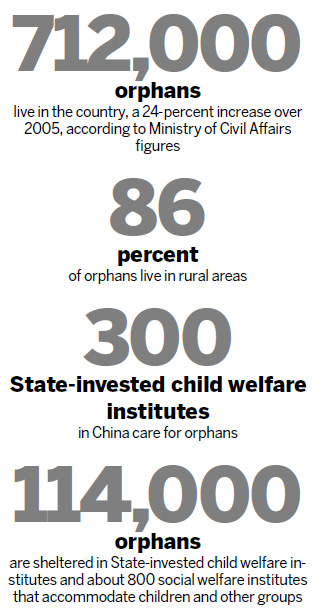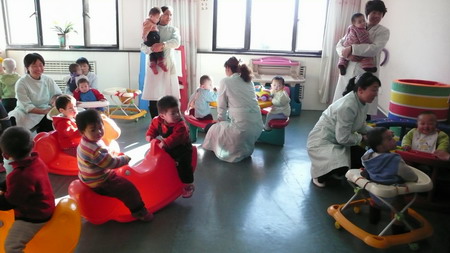China
Orphans better off with families: experts
By Lan Tian and Sun Ruisheng (China Daily)
Updated: 2010-12-10 07:58
 |
Large Medium Small |
|
|

DATONG, Shanxi - Family-based foster care is one of the best ways to bring up orphans, as real homes are better for children's development than institutions, child welfare professionals have said.
The Datong Institute of Social Welfare (DISW) in Datong, a city in northern Shanxi, is one of China's earliest State-invested social welfare institutes. It has developed a methodology for raising orphans that experts call the "Datong foster care model", which began taking shape when the institute was founded in September 1949.
Located at the border junction of Shanxi and Hebei provinces, and the Inner Mongolia autonomous region, Datong had a large floating population that included vagrants and orphans on the eve of New China's founding.
At that time, the institute had only two workers, who were unable to care for all the orphans. They had to send the infants to local rural families with women who could breast-feed. The local government compensated foster mothers with a few kilograms of millet.
"The institute managers did not have any other choice then," DISW Director Jin Baoli said.
"They would never have imagined their decision would turn out to be the best model for orphans' development. Decades of practice have proven that growing up in the warmth of a family makes it easier for an orphan to engage in real social life and reduces crime among orphans who are minors."
There are about 712,000 orphans nationwide, a 24-percent increase over 2005. About 86 percent live in rural areas, according to this year's Ministry of Civil Affairs figures.
China has about 300 State-invested child welfare institutes and about 800 privately run welfare institutes that accommodate children and other groups. They care for 114,000 orphans.
In 2003, the ministry issued a regulation to better supervise family foster care, which provided a legal basis for placing foster children with families. The Datong city government soon after issued measures on the protection of abandoned children's rights and interests, which became the country's first city-level regulation to safeguard the rights of orphans and disabled children.
The regulation stated minors abandoned by their biological parents can be raised by families with adult guardians aged 30 to 65.
The regulation included standards for foster families. Families must have stable incomes, no criminal records or serious diseases, prefer to have their own biological children and enjoy good relations with their neighbors.
Qualified families can apply to become foster households but must first complete training classes and pass exams organized by the DISW.
Foster families are required to sign contracts with civil affairs departments. The foster placements can be either long term or short term. Local civil affairs departments, which are the government bodies responsible for orphans, compensate foster families to cover the children's costs of living, education and medical care.
"Over the past 61 years, Datong's foster family model has developed in a more scientific and strict way," DISW Deputy Director Mao Ruibo said.
The institute's staff members also regularly visit and evaluate foster parents, who are required to faithfully report foster children's conditions, she said.
Since 1949, more than 7,000 orphans from DISW have been brought up by 1,500 families in about 50 local villages.
Among them, more than 70 orphans have received university educations. Nearly 4,000 have been adopted. About 1,500 have found jobs and have been earning their own livings.
The only local criminal case related to an orphan took place when a boy with an intellectual disability stole 5 yuan ($0.75) from a cab driver, Jin, DISW's director, said.
"Research shows crime rates among orphans are usually high, as youths often suffer psychological problems resulting from a lack of family support," Jin said. "But hardly any of Datong's foster children have criminal records, which testifies to the model's positive outcomes."
But challenges remain, Jin said.
The number of foster families is shrinking with economic development and the rise of farmers' income. Farmers in rich villages are more reluctant to become foster parents, because they do not find the 650-yuan monthly subsidy attractive, Jin explained.
The central government can solve the problem by increasing the allowance, he said.
"The biggest problem we are facing is not money but rather figuring out how to ensure better developmental environments for orphans in rural foster families," Jin said.
Consequently, the institute has begun to shift its focus from villages to cities by increasing the number of urban foster families, Jin explained.
"Our final goal is to establish a scientific mechanism to place all orphans in the institute in foster homes," he said.
For the next five years, the central government plans to establish a basic guarantee system for orphans and safeguard their basic rights to make their lives happier and more dignified, the State Council's General Office said in a circular on Nov 18.
Local governments were urged to use various approaches to expand channels for the placement of orphans, including institutional care, family foster care and adoption.
Authorities will ensure orphans' basic living standards by funding their educations and medical services, improving medical rehabilitation for those with disabilities, and supporting adult orphans' employment and housing.
The central and local governments at all levels should also allocate special funds to ensure the timely provision of basic living expenses.
China Daily
